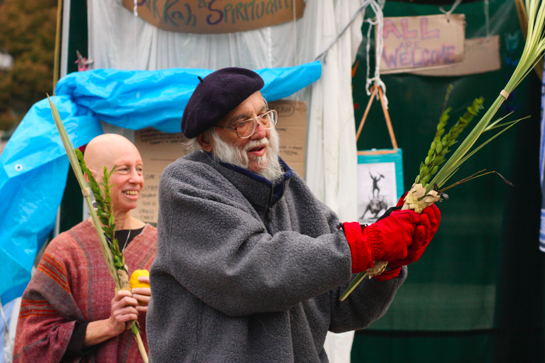Here we are, as I write, having voted an authoritarian anti-democratic leader out of office, hoping he leaves without creating too many new crises, knowing how much rebuilding and new building we have to do, challenged on many too many different fronts, fraught with worry for ourselves, our families, our communities, our country and the globe.
Overwhelming? Yes. But we know we cannot retreat to the convenience of being overwhelmed. that is a luxury we don’t have. Wouldn’t it be wonderful and a true deliverance if at this precise moment we had a new guide, a guide that recognized our confusion, that acknowledged that the earth was moving under our feet, a guide that drew on tradition and history that felt familiar, a guide like the one Maimonides wrote—a guide for the perplexed.
Well, we don’t have to wonder what this would be like because….we do!!

We have this extraordinary book by Rabbi Arthur Waskow, Dancing in God’s Earthquake. Here the passionate musings of a distinguished community elder are brought together in a book for us to read, to delve into, to study, to carry with us as a resource and comfort as we set about the challenging task of putting our country back on a better footing.
Arthur Waskow knows our potential and how far we have yet to go to realize it, and he is determined to give us food for that journey. He urges us to embrace change, to recognize that we live in challenging times, when all is shaken and much is turned upside down, a time when we have to determine what we are going to do. He asks if we going to stay rooted where we are, remembering the past, bemoaning the last four years, and paralyze ourselves into a false certainty that we won’t make that mistake again, and he advises that we must not do that.
He challenges us, instead, to acknowledge the many different earthquakes swirling around us from COVID-19 to race violence to climate destruction to gender inequity and step forward. He advises that our only choice is to learn how to dance in/on/with these multiple seismic shifts, these harbingers of our ultimate destruction so that we turn them to work for us and we become, in the process, the transformative force that is needed to create massive social change.
And Rabbi Waskow makes it abundantly clear that we do not have to do this alone, that we need to act collectively, that we need to reach across lines of difference to people of other faiths, and that we need to reach down into our texts and traditions and look at them in new ways. He urges us to engage in the kinds of debate that so marked the rabbis and scholars of old; he says, at one point: “The critics may be right or wrong. but they must be heard, and then we make our judgment….which will be wiser if we listen.”
Logical, of course, but too often ignored. And in this book, not only the ideas but the instructions are presented like poetry on a cold day. They warm not only our minds but our hearts. They hold out on every page the possibility of questioning history, learning from others, finding new ways through to the truths we need so desperately.
To be more specific for a moment, the book takes a radical look at how our societies do, but should, treat women; a set of not very likely but, in fact, doable ideas for observing a modern day shmita year that reduces the income gap and creates some economic justice; a quickly added foreword that dissects the current pandemic even as it continues to rage and itemizes precisely what we need to be learning from it.
Throughout the book, the imagery is extraordinary. The ground is chewed up and thrown asunder and we cannot successfully just walk along, but we can dance, think of new ways of being and new combinations of people and ideas, use religion not as a fixed talisman but as a way back and a way forward to times when we were and can again be differently united.
This book warms the heart and the mind both. It challenges our deepest certainties and asks us to face the chaos, to question history, to build new connections. It builds beautifully on the metaphor of dance, the instruction to keep moving as we question history, investigate text, and come up with new ideas that might just see us through and dance us into the future.
The book is seriously theological but even more deeply spiritual. It guides not only our thinking but our breathing, it immerses us in the vision of better realities which is precisely what we need to move forward, right now, with new leaders but no time or space for sitting still. We must dance with those new leaders, but even more, we must challenge them to dance with us, to again recognize the power of hope to help us build a better world. We must pray, we must recognize and celebrate our holidays, not forget ritual but not be so bound by that we miss the ways to shape it differently so that it adapts more easily to modernity.
The book is theological and spiritual but—to return to our opening—it is also practical. It addresses contemporary problems, it pulls no bunches and that is what makes it essential for our times. Read it and learn, read it and listen, read it and hope, read it and act. Dance with Waskow toward change.
